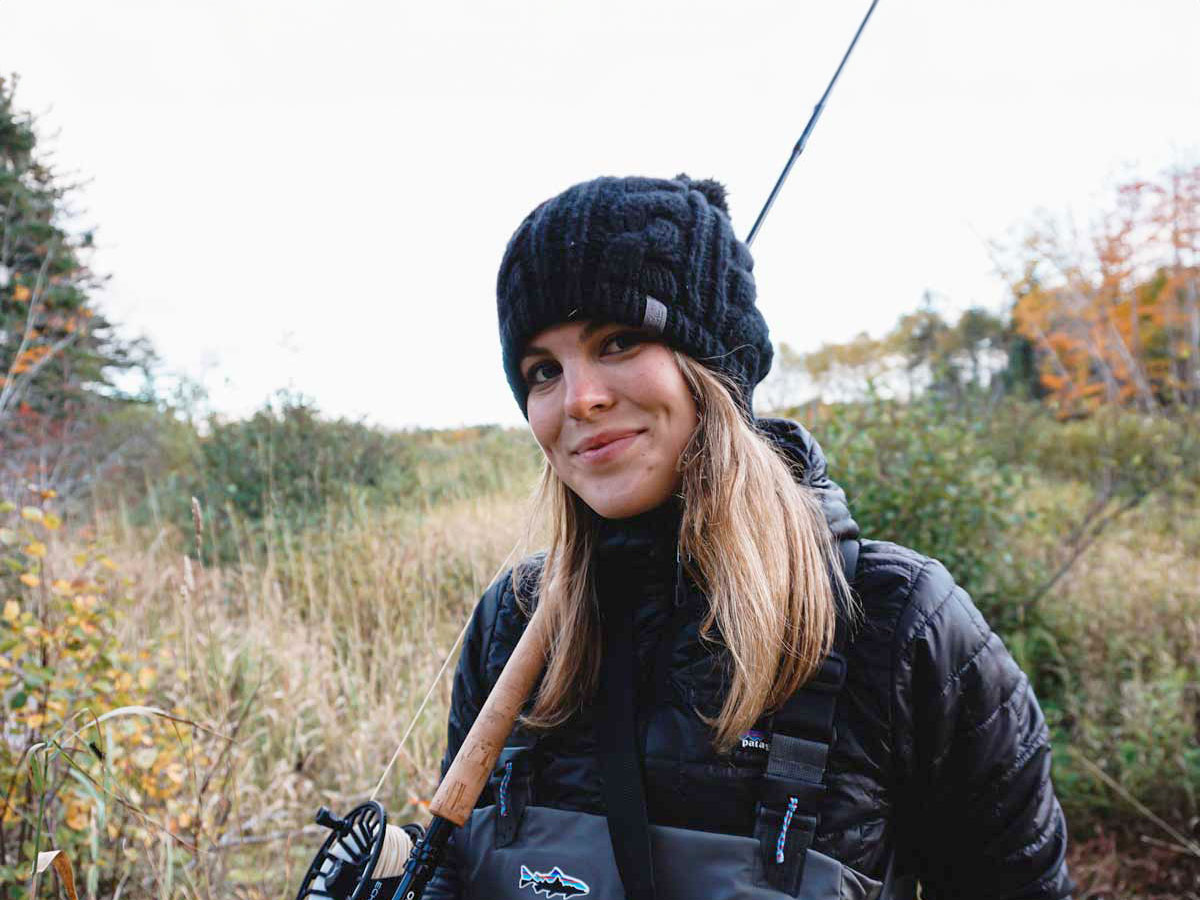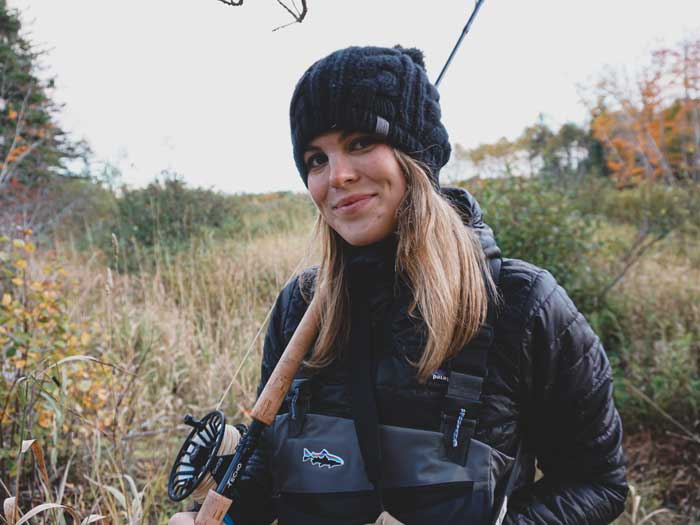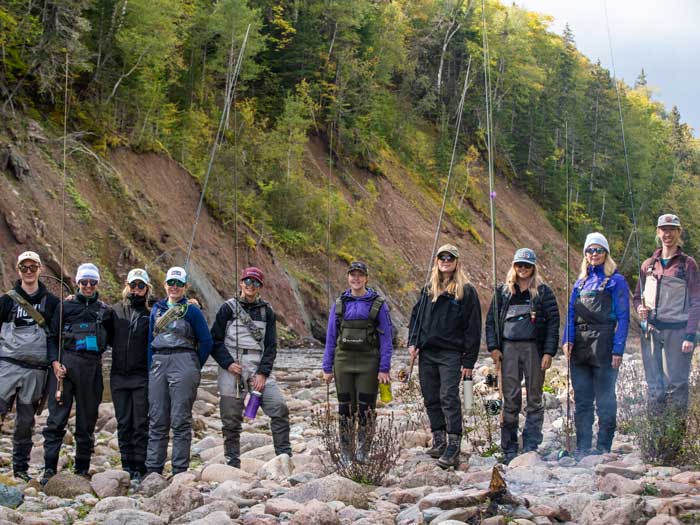
Meet the CPA forging a new path for women
 CPA Gioia Usher returned to her hometown of Isle Madame, Nova Scotia in 2017 (Courtesy of Gioia Usher)
CPA Gioia Usher returned to her hometown of Isle Madame, Nova Scotia in 2017 (Courtesy of Gioia Usher)
If it’s a weekend during fishing season, you’ll likely find Gioia Usher following the bends of Cape Breton Island’s Margaree River with a fly rod in hand in search of Atlantic salmon. The 29-year-old licensed fly-fishing guide from Isle Madame, Nova Scotia, is a self-professed fishing fanatic who grew up tagging along with her dad on the shores of Cape Breton. Often the only young woman in the male-dominated fishing community, Usher wanted to change that by getting women out on the water. Last summer, she started running all-women fly-fishing retreats on the heritage-designated river to introduce newcomers to the sport, break down barriers and create a safe space for beginners.
Her passion project, Metal + Mayflies, combines two meditative hobbies: fly fishing and metalwork. During the off-season, the self-taught metalsmith tinkers in her studio, forging handcrafted silver jewellery inspired by the flora and fauna of the island—chunky rings reminiscent of jagged coastlines and earthy turquoise stones inspired by the curve of a stream. “For me, both the fishing and the jewellery are a creative outlet,” says Usher, a CPA who began her career with EY in Halifax. As classmates made moves to bigger cities, Usher returned to her small hometown to work at Grant Thornton as a senior accountant in 2017.
She’s now the CEO of We’koqma’q First Nation, a Mi’kmaq community on Unama'ki, where she works with Chief Annie Bernard-Daisley and Council to carry out the strategic plan—a role that prioritizes the well-being of the community’s members. “It's a really rewarding job,” she says. The move brought with it a lifestyle change that means time spent trekking through river beds and sharing her love for fishing with others.
PIVOT: What’s it like to guide beginners on the river and share that knowledge?
GIOIA USHER (GU): I’m the only operating female fishing guide on the island and it creates a demand because women anglers are the fastest-growing market in fly fishing. They see me as approachable and providing a safe space to learn, ask questions and get involved. As a beginner, you feel safer with someone that you can relate to. It’s sometimes easier to go to a woman as another woman.
The fact is, women have been underrepresented in fly fishing forever. Very slowly, it’s changing. Through fishing, I’ve met a few really good girlfriends. We fish together and we don’t even second-guess it anymore. But, before, we would be nervous. It’s about building up your support system, being confident and realizing that you belong there, too.
PIVOT: How have you impacted the women you guide?
(GU):I still stay in touch with everybody that I guide. I guide them for that day, but they call me after to say, “Oh my God, I caught a fish today.” Or, “I bought this new rod, can you recommend what line I should put on it?” They have this resource that they can keep going to. It’s more than just one day, it's a relationship that continues on.
 A 2021 fly-fishing expedition along the Margaree River on Cape Breton Island (Courtesy of Gioia Usher)
A 2021 fly-fishing expedition along the Margaree River on Cape Breton Island (Courtesy of Gioia Usher)
PIVOT: Why did you become a CPA and how does your designation help you today?
(GU): My godparents encouraged me to get my CPA. They always said, if you push through it, you will eventually get to a point where in any business organization that you work in, you can use those skills to do whatever you want—and it doesn’t have to be accounting. Now, when I go to work, it’s more strategic thinking and working with people to make things happen versus being behind the desk, punching in the numbers. That feels really good, because that's something that I really wanted to do.
PIVOT: As a CFO, what does a typical workday look like and how do you manage the responsibility of such a meaningful position?
(GU): In the mornings I respond to emails, analyze financial information and do some independent thinking. This is where I am especially grateful for the skills I acquired as a CPA—they provide me with an edge and foundation for any decisions that need to be made. The remainder of my day is usually spent in meetings—whether it is a regularly scheduled Chief and Council meeting, discussions with a potential business partner or an internal meeting to discuss progress on a particular objective.
I am grateful every day for the opportunity to serve this community by trusting, listening and learning from the vibrant team at We’koqma’q. I’ve learned that an important element of Mi’kmaq culture is to help one another and it has made for a very supportive work environment where we reach our goals as a team. We take on responsibilities together while relying on our unique individual skill sets. I also look up to Chief Annie. She was the first elected female chief in We’koqma’q and is a great role model for women in leadership.
PIVOT: How did you get into metalwork and jewellery making?
(GU): I always liked making things. My dad enjoys doing knife work and working with old metals, so that got me fired up. I think jewellery was a natural progression of doing something that was metal-based, but with more of a feminine twist on it. I didn’t want to make a hatchet, I wanted to make something that was pretty and I could wear.
Fishing keeps me busy from April to October and then, in the winter months, I can put my head down and do some jewellery, just as a personal hobby and meditative craft. I find it a really good way to wind down from a stressful week.
PIVOT: How do you achieve that elusive work-life balance?
(GU): Life balance is definitely something I've been working on. When I’m guiding, it’s either after-hours, weekends or vacation days. It’s hard to not get burned out. Sometimes, I even think, gosh, I should just give up doing jewellery. But I love doing it, so it’s a tough balance. I also learned that if I don’t do those things, I’m just unhappy and I don’t have anything fun to look forward to.
Moving back to Cape Breton, I knew that it was a lifestyle change. That’s what I wanted. I was working 60-hour weeks and I burned out. I knew if I came back here, my life would be different. It would allow me to do the things I wanted to do. People look at me like, Oh, my God, I wish I had time for that. But it’s like, well, I have great hours at work. I work hard when I’m there. I work hard on weekends and evenings when I need to. The other times, I try to relax. Then I can go to work on Monday feeling better and do a good job all over again.
MEET OTHER CPAs MAKING AN IMPACT
Read about the CPAs using social media to share their financial knowledge. Plus, find out how this CPA mixes hockey and leadership.